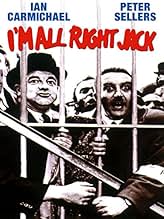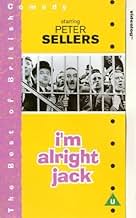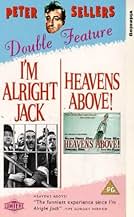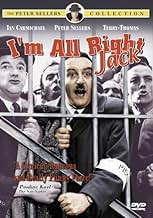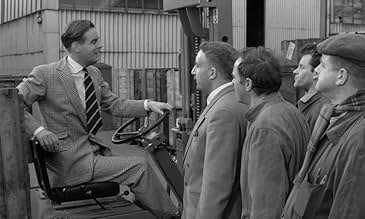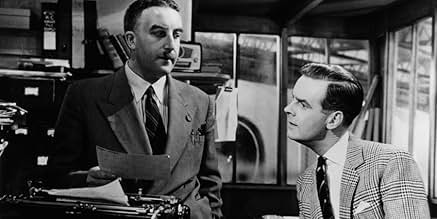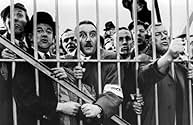AVALIAÇÃO DA IMDb
7,1/10
4,6 mil
SUA AVALIAÇÃO
Adicionar um enredo no seu idiomaA naive aristocrat in search of a career becomes caught up in the struggles between his profit-minded uncle and an aggressive labor union.A naive aristocrat in search of a career becomes caught up in the struggles between his profit-minded uncle and an aggressive labor union.A naive aristocrat in search of a career becomes caught up in the struggles between his profit-minded uncle and an aggressive labor union.
- Direção
- Roteiristas
- Artistas
- Ganhou 2 prêmios BAFTA
- 3 vitórias e 1 indicação no total
Dennis Price
- Bertram Tracepurcel
- (as Denis Price)
Avaliações em destaque
After the second world war is over, a new spirit of togetherness is fostered in the UK, and industry blossoms. Eager to get involved, the well-to-do Stanley Windrush tries to get a management job but fails. However some friends of the family, head of industry types get him a job with the workers at a missile factory. However his enthusiasm gets him in trouble with the all-powerful unions but is that what the bosses planned for all along?
First of all I cannot believe that this film has so few votes and comments (at time of writing this it's 270 and 5 respectively). I know this doesn't correlate with the number of users who have seen the film but it is a fair representation! I find that shocking, as this is one of the stronger satires I've seen for a good long while. The plot is a sort of comedy ploy by the bosses to shift work around to other firms (by relying on their own firm striking) and get personally rich as a result, however it is the satirical edge that makes it worth watching. Both bosses and unions get it in the neck here neither coming off well in the wash!
Bosses are seen as profit driven and not looking at the greater good, workers on the other hand are seen as looking after themselves while the unions cause more problems than they solve! There is an element of truth in all this that's why it is funny although it is obviously laid on a bit strong in the name of comedy. As a current worker in the UK manufacturing industry (yes, there is some left although it's an American company!) I am greatly amused by the caricatures as some elements (happily less each year) of them can still be seen in my place of employment! The management get off quite light as they are actually, at core, trying to improve the business's efficiency and thus compete with foreign firms. The workers and the unions get the hardest stick which is a little unfair after all the workers make the least and are the ones at risk, while the unions have brought about great steps in workers rights. For example it was funny for me to see FLT's moving around in heavily pedestrianised areas nowadays many larger factories will be totally segregated between vehicles and workers.
The plot does manage to mix the swipes so that it seems fair on the surface it is a pretty damning dig at British industry and, from modern views, it is quite prophetic as British industry has really fallen in the past few decades. The `one out, all out' strike mentality is well spoofed here but there's no doubting the damage that it (with other factors) has had. The only downside of the film looking back, is the racist views and racist language that is used at a couple of moments but in fairness these are not THAT offensive and can be overlooked as the culture of the film at the time.
Despite the quite anti-union feel to the film, Sellers does well to not overplay his character. The socialist worker type is really easy to get laughs off but Sellers brings out character and doesn't just go for an out and out mockery of the character. Carmichael is OK in the lead but is overshadowed by the sheer depth of excellent support roles. Le Mesurier's excellent, twitchy efficiency expert, Thomas' manager sweating and terrified of the workers he calls `an absolute shower' in the way only he can say it! Further faces fall into the film in the distinguished shapes of Attenborough, Rutherford and Price to name a few.
Overall this film comes out as a very classy satire. It hits the nail on the head and, over 40 years later, much of it can still be seen today and the damage from the stuff it satirises is being felt. The film is funny if you have a passing understanding of British industry in terms of politics, workers rights and unions even without this understanding the central plot is broad enough and funny enough to be worth seeing!
First of all I cannot believe that this film has so few votes and comments (at time of writing this it's 270 and 5 respectively). I know this doesn't correlate with the number of users who have seen the film but it is a fair representation! I find that shocking, as this is one of the stronger satires I've seen for a good long while. The plot is a sort of comedy ploy by the bosses to shift work around to other firms (by relying on their own firm striking) and get personally rich as a result, however it is the satirical edge that makes it worth watching. Both bosses and unions get it in the neck here neither coming off well in the wash!
Bosses are seen as profit driven and not looking at the greater good, workers on the other hand are seen as looking after themselves while the unions cause more problems than they solve! There is an element of truth in all this that's why it is funny although it is obviously laid on a bit strong in the name of comedy. As a current worker in the UK manufacturing industry (yes, there is some left although it's an American company!) I am greatly amused by the caricatures as some elements (happily less each year) of them can still be seen in my place of employment! The management get off quite light as they are actually, at core, trying to improve the business's efficiency and thus compete with foreign firms. The workers and the unions get the hardest stick which is a little unfair after all the workers make the least and are the ones at risk, while the unions have brought about great steps in workers rights. For example it was funny for me to see FLT's moving around in heavily pedestrianised areas nowadays many larger factories will be totally segregated between vehicles and workers.
The plot does manage to mix the swipes so that it seems fair on the surface it is a pretty damning dig at British industry and, from modern views, it is quite prophetic as British industry has really fallen in the past few decades. The `one out, all out' strike mentality is well spoofed here but there's no doubting the damage that it (with other factors) has had. The only downside of the film looking back, is the racist views and racist language that is used at a couple of moments but in fairness these are not THAT offensive and can be overlooked as the culture of the film at the time.
Despite the quite anti-union feel to the film, Sellers does well to not overplay his character. The socialist worker type is really easy to get laughs off but Sellers brings out character and doesn't just go for an out and out mockery of the character. Carmichael is OK in the lead but is overshadowed by the sheer depth of excellent support roles. Le Mesurier's excellent, twitchy efficiency expert, Thomas' manager sweating and terrified of the workers he calls `an absolute shower' in the way only he can say it! Further faces fall into the film in the distinguished shapes of Attenborough, Rutherford and Price to name a few.
Overall this film comes out as a very classy satire. It hits the nail on the head and, over 40 years later, much of it can still be seen today and the damage from the stuff it satirises is being felt. The film is funny if you have a passing understanding of British industry in terms of politics, workers rights and unions even without this understanding the central plot is broad enough and funny enough to be worth seeing!
If it hadn't been for the fact that a similar (though less cynical) film had been made just a few years earlier (THE MAN IN THE WHITE SUIT), I might have scored this parody a bit higher. Despite obviously being a comedy, the film is an amazingly insightful attack on the floundering state of British labor following the Second World War. While Britain used to be the most productive country on the planet, during this era they were torn apart by strikes and work slowdowns. Yet the film doesn't just attack labor unions with their unreasonable demands and poor work ethic. It also attacks factory owners who actually exploit this to their own interests. This film is obviously a loud declaration that the British Empire is in fact dead.
The film begins with an upper class twit named 'Windrush' going to work for the first time. However, he really isn't cut out for management despite his Oxford education--and he seems better suited to manual labor. The problem is that after failing again and again in management, he is simply too good as a blue collar worker. This is because he works way too hard and makes all his extremely lazy co-workers look bad! And, when management documents how much work one motivated man CAN do, this ultimately results in a strike, as management wants the workers output to increase--or at least that's what they claimed. All this set in motion by a slow-witted but very decent upper class gent working as a forklift driver!!
The film is very well written and clever. While younger audience members might not appreciate the film's insights, it is funny in a droll sort of way. Additionally, having wonderful actors such as Peter Sellers and Terry-Thomas sure didn't hurt! Overall, sharp social and political satire that does a great job of attacking labor and management and giving insights into the decline of the British economy.
The film begins with an upper class twit named 'Windrush' going to work for the first time. However, he really isn't cut out for management despite his Oxford education--and he seems better suited to manual labor. The problem is that after failing again and again in management, he is simply too good as a blue collar worker. This is because he works way too hard and makes all his extremely lazy co-workers look bad! And, when management documents how much work one motivated man CAN do, this ultimately results in a strike, as management wants the workers output to increase--or at least that's what they claimed. All this set in motion by a slow-witted but very decent upper class gent working as a forklift driver!!
The film is very well written and clever. While younger audience members might not appreciate the film's insights, it is funny in a droll sort of way. Additionally, having wonderful actors such as Peter Sellers and Terry-Thomas sure didn't hurt! Overall, sharp social and political satire that does a great job of attacking labor and management and giving insights into the decline of the British economy.
I was quite surprised with this film, not because of liking it (I did), but just how much union politics the Boulting Brothers put on their sleeve with working on this movie. I have been in a Union business that failed before, and I was quite shocked at how much I could compare my own experiences with what was on display here with the Unions and Management trying to maneuver themselves ahead of on another. While Peter Sellers does put on a great performance, this really is Ian Carmichael's movie. I hadn't seen any of his work, and this was a great introduction. All of the other cast is great as well. One final note, it probably contains the most annoyingly catchy title song ever, it'll probably haunt your cranium for days.
Ah, progress. Never mind that tosh. "I'm All Right Jack" is a hilarious send up of the 20th century very much on point today, an anything-goes capitalist-meets-socialist system where workers and owners are equally victimized.
Peter Sellers won the British Academy Award for Best British Actor for his performance as union leader Fred Kite, beating out a field that year which included Laurence Olivier, Laurence Harvey, Richard Burton, and Peter Finch. Ian Carmichael is the actual lead actor in "I'm All Right Jack", and Kite doesn't even show up until after the first 20 minutes, but Sellers makes Kite a compelling and comedic character worth remembering as a symbol of organized labor run amuk.
A kind of sequel to "Private's Progress", also featuring Carmichael in the role of Stanley Windrush, "I'm All Right Jack" is a swinging social satire. Two factory owners (played by Dennis Price and Richard Attenborough) conspire to create a labor strike at a munitions factory to get a higher price. To do that, they need someone to create a bit of friction. Enter Windrush, a total innocent upper-class twit who only cares about earning his pay, no matter how much that offends Kite and other labor leaders.
"We're living in the welfare state," says the middle manager Hitchcock (Terry-Thomas). "I call it the farewell state."
"I'm All Right Jack" starts out very cheeky indeed, with a surprising eyeful of female nudity circa 1959 and cracks at religion and the military. Later, a stuttering character sees an array of photographers and asks: "Why don't you tell them to f-f-f-photograph something worthwhile."
The only major problem with "I'm All Right Jack" is the slowness of the film right up until Windrush arrives at Missiles Ltd., after which the comedy becomes a kind of classless class comedy, where shrapnel flies thick and fast and no one is immune. Sellers' performance is brilliant, giving you a character who's likable even as he plays the antagonist. You can scorn his love of Stalinist Russia, which he boils down to cornfields and ballet, but you empathize with his fairness (not wanting to fire Windrush is his undoubted downfall) and his sensitivity for the feelings of Mrs. Kite (Irene Handl) and their daughter (Liz Fraser). He's just a bit extreme.
"We cannot and do not accept the principle that incompetence justifies dismissal," Kite argues. "That is victimization."
The real bad guys are the bosses guying the system, though John Boulting, who directed and co-wrote this with Alan Hackney and Frank Harvey, wants you to see the union abuses that make such a scam not only possible but desirable to the upper classes.
Sellers also appears at the film's outset as "Sir John", a men's-club inhabitant who witnesses the end of World War II as an unpleasant upending of the old social order, before disappearing in the postwar wake. "A solid block in what seemed the edifice of an ordered and stable society," is his postscript.
Contrast him with the very hip, 60s-sounding Al Saxon theme song that sticks its post-war, pre-Beatles attitude in your face as smartly as flipping the bird to Churchill (something else we get to see in the first few minutes), and you find yourself watching what had to be for 1959 a very mod film. It still stands up today as one of the best labor-management comedies, even if the British class system it addresses is no more.
Peter Sellers won the British Academy Award for Best British Actor for his performance as union leader Fred Kite, beating out a field that year which included Laurence Olivier, Laurence Harvey, Richard Burton, and Peter Finch. Ian Carmichael is the actual lead actor in "I'm All Right Jack", and Kite doesn't even show up until after the first 20 minutes, but Sellers makes Kite a compelling and comedic character worth remembering as a symbol of organized labor run amuk.
A kind of sequel to "Private's Progress", also featuring Carmichael in the role of Stanley Windrush, "I'm All Right Jack" is a swinging social satire. Two factory owners (played by Dennis Price and Richard Attenborough) conspire to create a labor strike at a munitions factory to get a higher price. To do that, they need someone to create a bit of friction. Enter Windrush, a total innocent upper-class twit who only cares about earning his pay, no matter how much that offends Kite and other labor leaders.
"We're living in the welfare state," says the middle manager Hitchcock (Terry-Thomas). "I call it the farewell state."
"I'm All Right Jack" starts out very cheeky indeed, with a surprising eyeful of female nudity circa 1959 and cracks at religion and the military. Later, a stuttering character sees an array of photographers and asks: "Why don't you tell them to f-f-f-photograph something worthwhile."
The only major problem with "I'm All Right Jack" is the slowness of the film right up until Windrush arrives at Missiles Ltd., after which the comedy becomes a kind of classless class comedy, where shrapnel flies thick and fast and no one is immune. Sellers' performance is brilliant, giving you a character who's likable even as he plays the antagonist. You can scorn his love of Stalinist Russia, which he boils down to cornfields and ballet, but you empathize with his fairness (not wanting to fire Windrush is his undoubted downfall) and his sensitivity for the feelings of Mrs. Kite (Irene Handl) and their daughter (Liz Fraser). He's just a bit extreme.
"We cannot and do not accept the principle that incompetence justifies dismissal," Kite argues. "That is victimization."
The real bad guys are the bosses guying the system, though John Boulting, who directed and co-wrote this with Alan Hackney and Frank Harvey, wants you to see the union abuses that make such a scam not only possible but desirable to the upper classes.
Sellers also appears at the film's outset as "Sir John", a men's-club inhabitant who witnesses the end of World War II as an unpleasant upending of the old social order, before disappearing in the postwar wake. "A solid block in what seemed the edifice of an ordered and stable society," is his postscript.
Contrast him with the very hip, 60s-sounding Al Saxon theme song that sticks its post-war, pre-Beatles attitude in your face as smartly as flipping the bird to Churchill (something else we get to see in the first few minutes), and you find yourself watching what had to be for 1959 a very mod film. It still stands up today as one of the best labor-management comedies, even if the British class system it addresses is no more.
Superior example of British comedy film making amongst a sea of duds. British film-makers never got it more right than here. Tremendous story and script plus wonderful performances from a whole host of character actors, especially Peter Sellers and Terry-Thomas.
Very funny satire on British industrial relations.
Very funny satire on British industrial relations.
Você sabia?
- CuriosidadesThe machines in the Num Yum factory are a spoof on the Moloch scenes from Fritz Lang's film Metropolis.
- Erros de gravaçãoWhile Stanley Windrush demonstrates his forklift driving skills for Mr. Waters, he says "Well, I'm shifting these generators from the stores to here, for loading up." He drives over a bump and the (presumed full) boxes bounce as though they were empty.
- Cenas durante ou pós-créditosOpening quote: "Oh! Brave New World that hath such people in't" --William Shakespeare
- ConexõesEdited into Heroes of Comedy: Terry-Thomas (1995)
Principais escolhas
Faça login para avaliar e ver a lista de recomendações personalizadas
- How long is I'm All Right Jack?Fornecido pela Alexa
Detalhes
- Data de lançamento
- País de origem
- Idioma
- Também conhecido como
- I'm All Right Jack
- Locações de filme
- Flexello Factory, 268 Bath Road, Slough, RU(Stanley Windrush walks up to the factory entrance)
- Empresas de produção
- Consulte mais créditos da empresa na IMDbPro
- Tempo de duração1 hora 45 minutos
- Cor
- Proporção
- 1.66 : 1
Contribua para esta página
Sugerir uma alteração ou adicionar conteúdo ausente

Principal brecha
By what name was Papai é um Nudista (1959) officially released in India in English?
Responda


